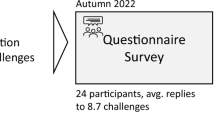Abstract
Process models capture important corporate know-how for an effective Business Process Management. Inconsistencies between process models and corporate reality are a common phenomenon in corporate practice. Human performance in process model development is a major source for these inconsistencies. In this contribution, a human performance analysis of process model development paying special attention to the concept of human error was conducted. It was found that the frequencies of the omissions and erroneous executions of notation elements are significantly higher for novices than for experienced modelers. Moreover, experienced modelers inherently adhere to a verb-object activity labeling style. The overall empirical results indicate that experienced modelers achieve higher process model quality with less expenditure of time than novices.
Access this chapter
Tax calculation will be finalised at checkout
Purchases are for personal use only
Preview
Unable to display preview. Download preview PDF.
Similar content being viewed by others
References
Becker, J., Kahn, D.: Der Prozess im Fokus. In: Becker, J., Kugeler, M., Rosemann, M. (eds.) Prozessmanagement. Springer, Berlin (2008)
Mendling, J., Recker, J.: Extending the Discussion of Model Quality: Why Clarity and Completeness may not be enough. In: Pernici, B., Gulla, J.A. (eds.): CAiSE 2007 Workshop Proceedings Vol. I - Eleventh International Workshop on Exploring Modeling Methods in Systems Analysis and Design (EMMSAD 2007), Trondheim, pp 109–121 (2007)
Wong, K.Y.: Critical success factors for implementing knowledge management in small and medium enterprises. Industrial Management & Data Systems 105(3), 261–279 (2005)
Schuh, G., Friedli, T., Kurr, M.A.: Prozessorientierte Reorganisation. Reeingineering-Projekte professionell gestalten und umsetzen. Carl Hanser Verlag, München (2007)
Indulska, M., Green, P., Recker, J., Rosemann, M.: Business Process Modeling: Perceived Benefits. In: Laender, A.H.F., Castano, S., Dayal, U., Casati, F., de Oliveira, J.P.M. (eds.) ER 2009. LNCS, vol. 5829, pp. 458–471. Springer, Heidelberg (2009)
van der Aalst, W.M.P., ter Hofstede, A.H.M., Weske, M.: Business Process Management: A Survey. In: van der Aalst, W.M.P., ter Hofstede, A.H.M., Weske, M. (eds.) BPM 2003. LNCS, vol. 2678, pp. 1–12. Springer, Heidelberg (2003)
Schuette, R., Rotthowe, T.: The Guidelines of Modeling - An Approach to Enhance the Quality in Information Models. In: Ling, T.-W., Ram, S., Li Lee, M. (eds.) ER 1998. LNCS, vol. 1507, pp. 240–254. Springer, Heidelberg (1998)
Krogstie, J., Sindre, G., Jorgensen, H.: Process models representing knowledge for action: a revised quality framework. European Journal of Information Systems 15, 91–102 (2006)
Mendling, J., Reijers, H.A., van der Aalst, W.M.P.: Seven Process Modeling Guidelines (7PMG). In: Information and Software Technology (IST), vol. 52(2), pp. 127–136. Elsevier B.V, Amsterdam (2010)
Jakobs, E.M., Spanke, J.: Sprache als Erfolgsfaktor industrieller Prozessmodellierung. In: Steinmann, C. (eds.) Evolution der Informationsgesellschaft. Markenkommunikation im Spannungsfeld der neuen Medien. VS, Wiesbaden (2011)
Weske, M.: Business Process Management – Concepts, Languages, Architectures. Springer, Berlin (2007)
Luo, W., Tung, Y.A.: A Framework for Selecting Business Process Modeling Methods. Industrial Management & Data Systems 99(7), 312–319 (1999)
Kalpic, B., Bernus, P.: Business Process Modeling in Industry – The Powerful Tool in Enterprise Management. Computers in Industry 47, 299–318 (2002)
Nielen, A., Jeske, T., Schlick, C., Arning, K., Ziefle, M.: Interdisciplinary Assessment of Process Modeling Languages Applicable for Small to Medium-sized Enterprises. In: Callaos, N., Chu, H.-W., Krittaphol, W., Lesso, W., Savoie, M. (eds.) The 8th International Conference on Computing, Communications and Control Technologies: CCCT 2010, IMCIC, Copyright Manager, Winter Garden, Florida, vol. II, pp. 47–52 (2010)
Rasmussen, J.: Skills, Rules, and Knowledge; Signals, Signs, and Symbols, and Other Dis-tinctions in Human Performance Models. IEEE Transactions on Systems, Man, and Cybernetics 15(2), 234–243 (1983)
Reason, J.: Human Error. Cambridge University Press, Cambridge (1990)
VDI 4006: Human Reliability Methods for Quantitative Assessment of Human Reliability. VDI-Gesellschaft (2003)
Mendling, J., Reijers, H.A., Recker, J.: Activity Labeling in Process Modeling: Empirical Insights and Recommendations. In: Information Systems (IS). Special Issue on Vocabularies, Ontologies and Rules for Enterprise and Business Process Modeling and Management, vol. 35(4), pp. 467–482. Elsevier B.V, Amsterdam (2010)
Killich, S., Luczak, H., Schlick, C., Weissenbach, M., Wiedenmaier, S., Ziegler, J.: Task Modelling for Cooperative Work. Behaviour & Information Technology 18(5), 325–338 (1999)
Field, A.: Discovering Statistics Using SPSS, 2nd edn. Sage Publications, London (2005)
Hollnagel, E.: Cognitive Reliability and Error Analysis Method: CREAM. Elsevier, Amsterdam (1998)
Author information
Authors and Affiliations
Editor information
Editors and Affiliations
Rights and permissions
Copyright information
© 2011 Springer-Verlag Berlin Heidelberg
About this paper
Cite this paper
Nielen, A., Költer, D., Mütze-Niewöhner, S., Karla, J., Schlick, C.M. (2011). An Empirical Analysis of Human Performance and Error in Process Model Development. In: Jeusfeld, M., Delcambre, L., Ling, TW. (eds) Conceptual Modeling – ER 2011. ER 2011. Lecture Notes in Computer Science, vol 6998. Springer, Berlin, Heidelberg. https://doi.org/10.1007/978-3-642-24606-7_42
Download citation
DOI: https://doi.org/10.1007/978-3-642-24606-7_42
Publisher Name: Springer, Berlin, Heidelberg
Print ISBN: 978-3-642-24605-0
Online ISBN: 978-3-642-24606-7
eBook Packages: Computer ScienceComputer Science (R0)




